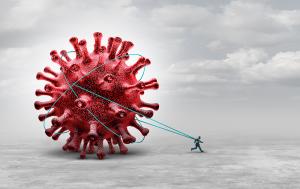30-09-2025 14:00
Long Covid: Current Realities, Future Directions

In the early stages of the pandemic, limited clinical knowledge and inadequate healthcare services meant that Long Covid was often undiagnosed, dismissed, poorly assessed, or inappropriately treated, often leading to frustration, stigma, and worsening health outcomes. Five years on, the risk of developing PCC has decreased; yet with SARS-CoV-2 still widely circulating, Long Covid remains a significant global public health challenge.
The impact of Long Covid extends far beyond individual health. It affects productivity, reduces workforce participation, and places considerable strain on national healthcare systems. These wide-ranging consequences make it imperative for the EU, its institutions, and Member States to coordinate their efforts - working hand in hand with patient communities - in providing citizens with improved knowledge, treatment, and support. Bridging the gap between scientific progress and patients' everyday realities is essential: advances in diagnostics, treatment, and rehabilitation must lead to tangible improvements in their quality of life.
This workshop builds on the outcomes of a previous EPRS event that examined the then-emerging understanding of Long Covid--its clinical profile, its impact on patients and society, and the urgent actions needed to address gaps in knowledge, raise awareness, and advance treatment development.
By bringing together MEPs, researchers, policymakers, healthcare professionals, communicators, and patient advocates, the workshop seeks to foster a coordinated, multidisciplinary debate on Long Covid. Its goal is to share insights, challenges, and innovations, while informing both citizens and specialized audiences about scientific progress, policy developments, and practical experiences. Ultimately, it aims to contribute developing effective and long-term strategies for addressing Long Covid across Europe.
Programme
14:00 - 14:05 Welcome and introductory remarks
- Laura BALLARIN
MEP and member of the Panel for the Future of Science and Technology (STOA)
14:05 - 14:20 Keynote address - Long Covid: Advances, Open Questions, and Patient-Centred Perspectives
- Evelina TACCONELLI
Full Professor on Infectious Diseases and Head of Infectious Diseases Division, University of Verona
14:20 - 14:55 Panel 1: Policy responses at European level on Long Covid
- Antonio PARENTI
Director of Public Health, Cancer and Health security, DG SANTE, European Commission
- Aliya KOSBAYEVA
Health Workforce and Service Delivery Unit, WHO Europe
- Frederico GUANAIS
Deputy Head of Health Division, OECD
- Diego CASTANARES
- Medical Expert, Belgian Health Care Knowledge Centre
15:05 - 15:45 Panel 2: Current challenges, best practices and future perspectives in research, healthcare and patient support
Moderated by Nicolás GONZÁLEZ CASARES, MEP and SANT Committee member
- Michèle VAN VUGT
Full Professor of Internal Medicine, University of Amsterdam
- Gemma TORRELL VALLESPIN
Medical Doctor and Researcher, Catalan Health Institute
- Gez MEDINGER
Patient Advocate and Author 'The Long Covid Handbook'
- Nicole SCHNEIDER
Dr. med. vet., Long Covid Europe
15:45 - 15:55 Q&A session
15:55 - 16:00 Closing Remarks
- Laura BALLARIN
MEP and STOA Panel member
The event will be held in English only, without interpretation.
The event will be web streamed. The link will be published on the event page.
